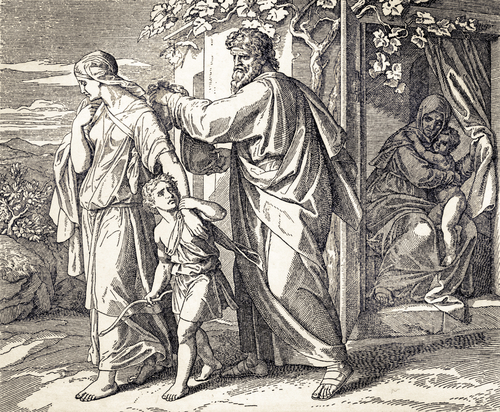Isaac and Ishmael
And Sarah saw the son of Hagar the Egyptian, whom she had borne to Abraham, scoffing. Therefore she said to Abraham, “Cast out this bondwoman and her son; for the son of this bondwoman shall not be heir with my son, namely with Isaac.” (Genesis 21:9-10)
God miraculously fulfilled His promise to Abraham and Sarah, and they had a son in their very old age, naming him Isaac. That name means “laughter,” and originally was a rebuke of the laughter of Abraham and Sarah at God’s promise (Genesis 17:17-19 and 18:12-15). God turned that gentle rebuke into an occasion for joy.

As Isaac grew, he experienced rough treatment from his older half-brother Ishmael. Isaac and Ishmael had the same father (Abraham), but Isaac’s mother was Sarah and Ishmael’s mother was Hagar, a servant from Egypt. Ishmael was much older than Isaac – probably about 13 years older – and he mocked his younger half-brother.
Sarah, the mother of Isaac, didn’t like that at all. Defending her son the way one would expect a mother to, Sarah demanded that Abraham send Hagar and her son Ishmael out of their home. What might seem cruel or excessive to someone else made sense from the perspective of a mother protecting her son.
Even more, God had a plan in all this. At the prompting of God (and Sarah), Abraham did send away Hagar and Ishmael. The two sons of Abraham, half-brothers, would not grow up together. Still, God preserved, protected, and even prospered Ishmael and his descendants. God has a purpose for the descendants of Abraham through Ishmael.
This is more than a story of persecution, obedience, and God’s faithfulness. In Galatians 4:22-29, the Apostle Paul used this conflict as an illustration of the conflict between those who are born of the promise and those who are born of the flesh.
In Galatians 4, the Jewish legalists who troubled the Galatian Christians protested they were children of Abraham and therefore blessed. Paul admitted they were children of Abraham, but they were more like Ishmael, not Isaac. The legalists claimed Abraham as their father, but Paul asked who was their mother – Hagar, or Sarah?
Ishmael was born of a slave and was born according by the efforts of the flesh, by man working in his own strength and apart from God’s promise. Isaac was born of a freewoman and was born according to the gracious promise of God.
That was why Paul used the analogy, because the legalists among the Christians in Galatia promoted a relationship with God based in bondage and according to the effort of man and not according to God’s promise. The true gospel of grace offers liberty in Jesus Christ and is a promise that is received by faith.
The lesson of this is not that God hated Ishmael. God blessed him, and Ishmael had an important purpose in God’s unfolding plan. The lesson is that God’s promise is always greater than man’s effort. Live today according to the power of His promise.


Leave a Reply
Want to join the discussion?Feel free to contribute!